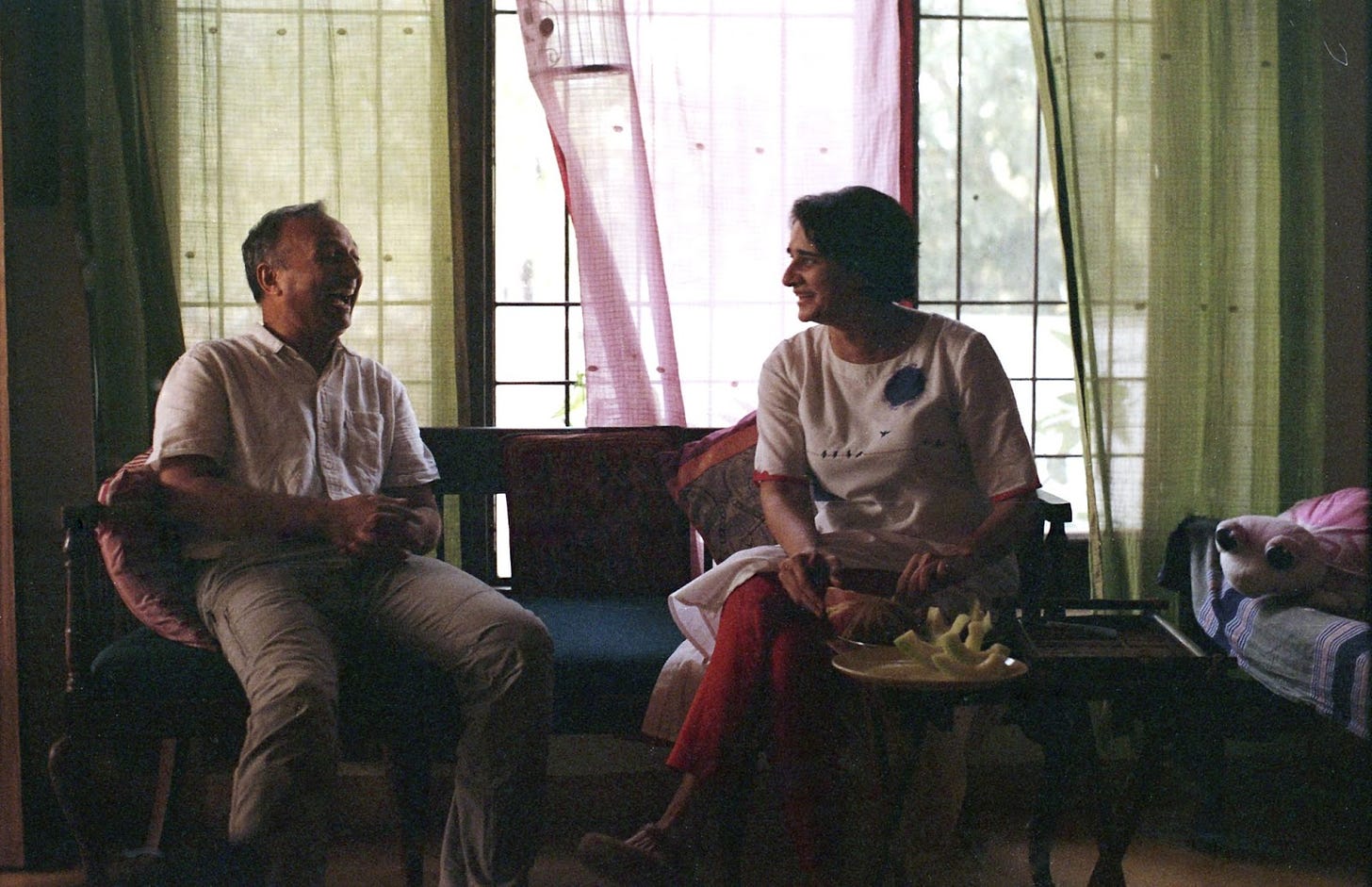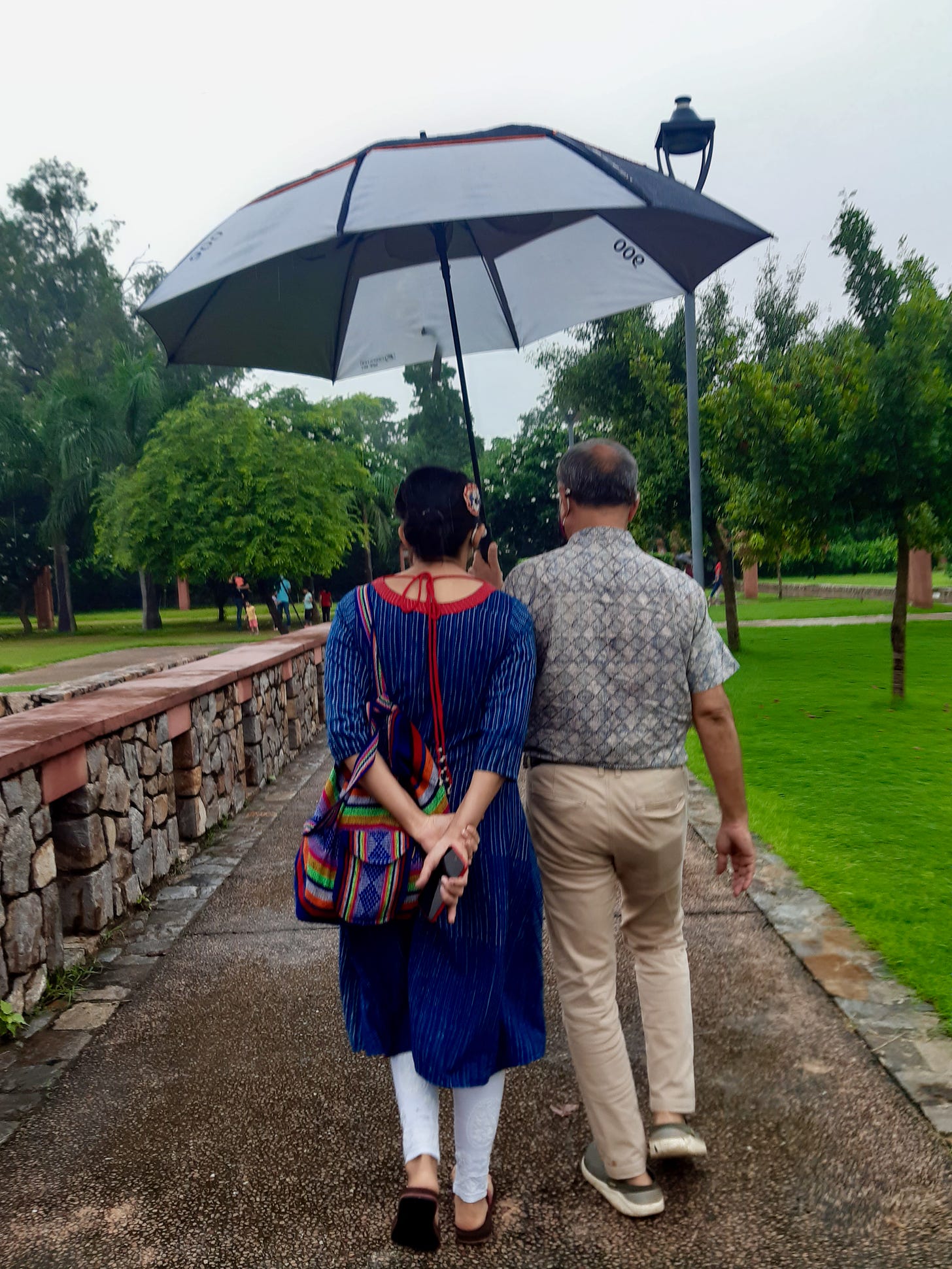How to make love stay in the age of anxiety
“Husband, you are a good bully,” I said to Afzal one day, dutifully following my therapist’s suggestion. “You called me a bully?” “Yes, I called you a good bully.”
“Do you call him your husband?” my therapist, Father Os, asked me one day.
“We don’t like the words—husband and wife,” I answered. “I rarely use this word for him.”
“Maybe you should,” he said. Father Os had a characteristic shrug. It was subtle. It spoke to me.
One thing common between Afzal and me was that both of us had a poor opinion of marriage as a concept. We judged the marriages we had witnessed, especially the ones that our parents had endured as they raised us. In our own way, we had made the decision to not fall into prescribed roles that stifle men and women. We didn’t want to become husband and wife—not like the ones we saw around us.
We got married suddenly. We had spent years together toying with the idea and had repeatedly come to the conclusion that we didn’t really want to risk marrying each other. On the day we thought that we would break up with each other forever and ever, Afzal got the bright idea to call Father Os and Pearl, who had been his therapists, and see if they would meet us once. We got lucky. Pearl asked us to come and meet them. Within half an hour of talking to them, we changed our mind about giving up on ourselves. They seemed to believe that we could be good together.
Ten years later, we had three children. I was mesmerised and fascinated by our little people. I loved my life. I also needed help. I called the same number we had dialled earlier to get perspective on why we seemed to be coping so badly. I was directed to Father Os’s weekly group therapy sessions.
“Maybe you should call him your husband,” Father Os said to me casually a few weeks later. I don’t remember if I wrote this sentence in my notes. I did take it seriously. Father Os spoke in short sentences, just enough to share the whiff of a new idea, often in a tone so low that one wasn’t sure whether one had heard him correctly. He rarely explained anything too much.
“Husband, you are a good bully,” I said to Afzal one day, dutifully practising my therapist’s suggestion.
“You called me a bully?”
“Yes, I called you a good bully.”
“You called me a bully?”
“Papa, she called you a good bully,” intervened our firstborn. “Relax.”
It is fun to call Afzal my husband. Especially when I call out to him from a distance. “Husssbend.”

My husband indulges me. I, on the other hand, am the only person who scolds him. We remind ourselves to switch roles sometimes, so that I can indulge him and he can scold me.
We’ve been spending a lot of time in doctors’ waiting rooms recently. Often this is the only time we get to hang out with each other for nearly half a day. We refer to these forays as dates.
Last week, we went to meet Dr. Dolkar, our Tibetan doctor, after spending the morning in the OPD of the ophthalmology ward of AIIMS in New Delhi. Dr. Dolkar has known us for nearly 15 years. She holds Afzal’s wrist to feel his pulse and closes her eyes in concentration.
“How is the pain in your legs?” she asks him.
“It is intense,” he says. “I am having difficulty sleeping.”
Dr. Dolkar asks about the results of his eye test. “Give me some good news,” she says. “You need to manage your stress.”
“We were in AIIMS all morning today,” he tells her. “They allowed only me to join the queue to meet the doctor and Natasha had to stand at a distance. Every time I looked at her, she had tears rolling down her face.”
“I didn’t bother anyone!” I jump to my defence immediately. “I was just a little overwhelmed by the suffering of elderly people and mothers with newborn babies waiting for their turn.”
“You should also cry a little,” says Dr. D to my husband, letting go of his wrist. “People who can cry are lucky.”
As she writes a prescription for him, she says, “My own tears have dried up. In our culture, we didn’t have the concept of emotional needs when I was growing up as a refugee child in Himachal Pradesh.” Her voice breaks as she speaks about raising her own daughters in Delhi and supporting them to study in the best institutions.
“You made Dr. D cry,” I say to Afzal as soon as we step out of her clinic. I notice his expression and let go of the joke I might have tried on him.
The more we accept our separateness, the more we create opportunities to come together again. Father Os is not here anymore, but I hear his voice guiding me when I slow down and allow myself to pay attention.
Collectively, we are emerging from the trauma and loss caused by a mismanaged global pandemic. The crumbling of democracies and loss of individual freedoms all over the world is wrecking our sense of belonging. Our relationships and personal well-being isn’t going to be immune to this brutal, slow-motion devastation.
We will need more space to act out our anxieties. Language may not always be adequate to offer succour. We must summon the resources to console, reassure and to move towards respair. We need to protect our loves so that love can protect us.
***
Read the full version of this essay in The Morning Context
URL: https://themorningcontext.com/chaos/respair-a-return-to-hope/





So true. We need to hold on to our loves, the tenderness within us and radical hope. And thanks for always reminding us how to do that even when it is difficult for you.
we all feel almost same but you have the ability to express on behalf of all of us.I really starved some time to have a big laugh like Afzal, but scared of trying as being an artificial one it might be stopped midway.keep going.